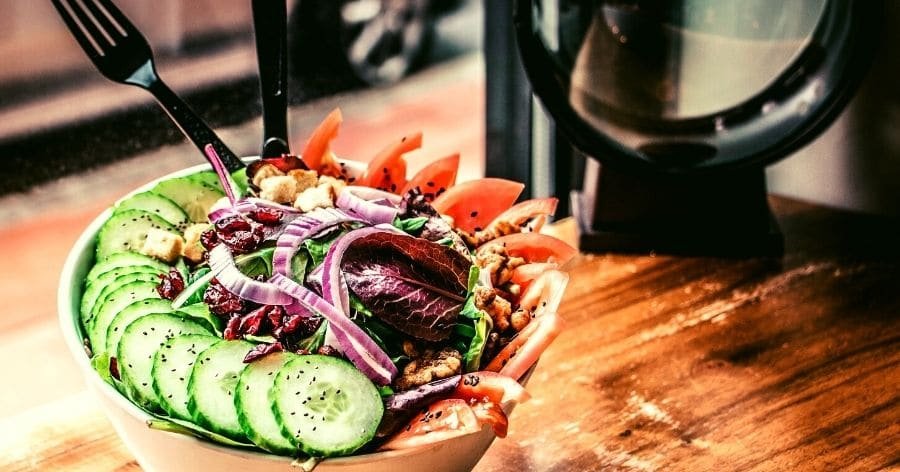Plant-Based on a Budget: Save Money by Eating Healthy

Several misconceptions surround the Whole Food Plant-Based lifestyle, for example that it is costly. Eating plant-based on a budget is hard – it is a common concern of people contemplating switching to a healthier diet.
Though the reality is different, the concern is totally valid. After all, food is an ongoing essential expense for each one of us. Most of us have to keep our budgets tight.
If you too worry about your budget going haywire if you choose a plant-based diet, this article is what you need. Let’s dig in deep to find out if healthy eating is possible with a small budget. Can you really eat plant-based without burning a hole in your pocket?
Is it possible to eat Whole Food Plant-Based on a budget?
Organic and plant-based alternative brands are perhaps most responsible for presenting vegan lifestyles as costly. These brands are launching organic or plant-based items in response to rising health consciousness.
The truth is that a plant-based diet is far beyond the organic or plant-based alternatives that you see in the market. The purpose of a Whole Food Plant-Based diet is to get the best nutrition from plants in their purest possible form.
A plant-based diet is not any more expensive compared to a non-plant-based diet. In fact, whole foods are often cheaper than their processed counterparts. The expenditure associated with a plant-based diet has more to do with our choices.
In essence, it is entirely possible to eat Whole Food Plant-Based on a budget.

Plant-based versus meat-based meals: How much does it cost?
A recent study by Veganuary, a plant-based movement in the UK, found that, on average, plant-based meals cost 40% less than meat-based meals at home. They also found vegan households spend on average 8% less on groceries than non-vegan families of the same size.
The Veganuary study suggests that overall, eating plants costs less. Moreover, meat and dairy tend to be among the costliest items on your plate. Removing these takes away a lot of load from your grocery bill automatically. You can spend the saved amount on plant produce.
Not to mention, you must already be eating a lot of plant-based items. So, your chances of going off track on budget remain low.
Savings comparison for eating plant-based on a budget
Various data by the USDA and other agencies suggest food at home typically costs each American over $4000 per year. Out of which roughly 40% of expenses go towards meat, dairy, eggs, snacks, and processed items.
According to data on commodity prices worldwide, the average price of 1 kg of meat in March 2021 was $13.26, while it was $3.72 for 1 kg of beans. You can imagine the difference each ingredient on your plate makes.
By shunning animal products, you don’t just help your pocket. You help the environment too.
Finally, how much you can save by eating plant-based on a budget really depends on you.
A typical daily Whole Food Plant-Based diet may cost you around $6.
- 50 gr beans/legumes – $0.5
- 230 gr whole grains – $2
- 300 gr vegetables – $1
- 200 gr fruits – $1
- Others (spices, non-dairy milk) – $1.5
For every $1 saved per day compared to your current diet, you save $365 per year per person.
Note that the amount you can save on a plant-based diet depends on your dietary preferences largely. It may go lower or higher with the ingredients you pick for your meals.
Keep reading to find the secrets to saving costs.
How else do you save money on a plant-based diet?
Besides saving costs on plant-based diet ingredients, you also get an opportunity to save some money indirectly. Two main indirect factors that can support your goal of going plant-based on a budget are reduced fuel consumption and better health.
Decreased cooking time
The type of food we consume impacts our expenses as well, which we tend to overlook. Another notable finding of the Veganuary study was that plant-based meals cook much quicker than meat-based meals. This indicates your cooking gas bills can significantly reduce if you cook plant-based dishes.
Lower medical expenses
The health benefits of a plant-based diet are immense. Plant-based diets reduce the risk of many diseases and help improve health if you have a health condition. It is also possible to reverse disease with a Whole Food Plant-Based diet. Thus, your chances of hospital visits or medications decrease. So do your medical expenses.

5 Secrets to saving costs on a plant-based diet
As we discussed earlier, saving money on a plant-based diet is more about the choices we make. Eating plant-based on a budget won’t be a significant challenge as long as you stay mindful.
If you are a vegan on a budget or planning to be one, here are a few secrets to saving money while eating healthy.
1. Shopping smart
Grocery shopping is the most critical activity when you’re trying to eat plant-based on a budget. A strategic approach can help save you a lot of bucks easily.
Here’s a list of the things that will help you shop smart every time you make a grocery shopping trip:
- Make a grocery list and stick to it. It will help you avoid spending on any item that you might not use.
- Buy budget-friendly products. You don’t have to buy exotic fruits or vegetables, which tend to be expensive. Instead, choose regular produce.
- Go for in-season produce as it tends to be cheaper.
- Purchase long-lasting products such as legumes and whole grains in bulk.
- Shop at local markets, such as farmers’ markets near you. Along with the cost benefits, you also get fresh produce.
- Pick generic brands at a supermarket or grocery store instead of a well-known brand.
- Skip vegan meat alternatives. Usually, these are the most expensive items.
- Go for cheaper substitutes. For example, if you want more protein, eat beans instead of vegan meat alternatives such as Beyond Burger.
- Ignore organic products as they are usually costly compared to non-organic. Organic food is not necessarily emphasized on a Whole Food Plant-Based diet.
2. Preparing filling meals
Some people on a plant-based diet find it difficult to feel full after eating. So, they end up getting hungry and eat more frequently in a day which can add to food expenses.
The real problem lies in what their meals constitute. Whole grains and legumes are excellent for keeping you satiated. Make sure you eat enough whole grains and legumes in a day. Vegetables such as sweet potatoes are also great to prepare a filling and nutritious meal.
Preparing a filling meal with the right mix of ingredients further helps you avoid additional costs on food.
3. Cooking at home
Cooking your meals at home is among the most effective ways to eating plant-based on a budget.
Frequently dining out can be very expensive. The average cost of a dish at a restaurant can be more than five times compared to cooking it at home. Vegan meals are also sometimes overpriced at restaurants.
Cooking at home not only saves a lot of your money but is healthier too. However, you may find it tough to cook all meals of the day if you’re a busy person. Bulk cooking or meal prep is the way to go to save time and money.
On your free days, you can prepare some portions of a meal that can last you for a week or so and expedite your cooking. For example, you can boil some beans, refrigerate them, and combine them in a quick dish. You may also chop some vegetables beforehand, freeze them, and use them when you need to.
4. Grocery planning
Even before you go shopping or create a grocery list, grocery planning is the money-saver step you must not skip.
Essentially, grocery planning involves thinking about your meals in advance. It is a vital step to saving costs on a plant-based diet. When you plan your meals for a week or month, you can easily visualize what you need to buy.
In addition, you should also audit your pantry to discover the well-stocked items. These are the items you can do without and should not make it to your shopping list.
You can also refine your grocery list by allocating a budget to different types of food. Such a plan will help you ensure you pick the essentials without having to think a lot. We recommend spending:
- At least 50% on different kinds of vegetables and fruits
- About 20% on items like potatoes, whole grains, lentils or beans
- Up to 20% on other optional items, such as seeds, nuts, spices, etc.
- The rest 10% to 15% on tofu, non-dairy milk, or other vegan alternatives
A well-planned grocery list will help you avoid grocery wastage and make your purchases cost-effective.
5. Using leftovers wisely
Leftover food can also sidetrack you from your goal of eating plant-based on a budget. When you throw food into the trash, along with it goes your money.
In the best-case scenario, you will not have any leftovers, be it raw or cooked. But, it is not always possible. If you end up with extra food, make sure you use it wisely if you don’t want your money to go to waste.
You can either refrigerate the cooked leftovers to eat later or recycle them into new dishes. For example, you can add leftover pasta to salad. If you have some raw vegetables about to perish, you can throw them all into a pot of water to cook and make vegetable broth. You can store and use it for a much longer time.

6 Mantras to avoid unnecessary expenditure
Now that you know the secrets of eating plant-based on a budget, it is a good idea to keep a few principles in mind to avoid any unnecessary expense.
1. Don’t fall for fancy stuff
A plant-based lifestyle is not left behind when it comes to fads. A celebrity may endorse something exotic. A brand may try to convince you to buy its products. Social media feeds may attract you towards good-looking food.
If you want to save money, avoid falling for the fancy stuff. Shift your focus to getting the most value from what your pocket allows.
2. Control your impulses
Our impulses are little monsters looking to divert us from the budget. When you go grocery shopping, keep your impulses in check. Don’t let yourself buy anything overly expensive for the sake of it or because it appeals to your senses.
3. Food wasted is money wasted
Avoiding wastage is critical to eating plant-based on a budget. If you don’t manage your kitchen well, expenditures will keep piling up. You can save a lot of money just by ensuring you use what you already have optimally.
4. Simplicity is the key
There’s nothing that should make your plant-based life complicated. Whenever you have doubts about a product or its price, stick to the tried and tested options. With whole fruits, vegetables, beans, legumes, and whole grains, you’re unlikely to go wrong.
5. Grow your own food (if you can)
Growing your own food is one of the best ways to maximize your savings on groceries. If you have sufficient time and space for a kitchen garden, consider growing some low-maintenance herbs and vegetables. For example, you can grow tomatoes, cilantro, capsicum, spinach, lettuce, etc.
You can control your expenses significantly if you manage to grow a consistent supply of produce. In addition, gardening has fantastic benefits for your physical and mental health. Thus, for your pocket as well.
6. Look at the bigger picture
Being vegan on a budget requires consistent effort on your part. Saving money on a plant-based diet is only a tiny part of the bigger picture. The benefits of a plant-based diet are holistic. It positively impacts other aspects of your life, such as health, where you can save further.
Conclusion
Eating healthy while saving money is in no way contradictory. The sense of costliness of plant-based diets primarily comes from the lack of awareness. Fads and our need for convenience add to misconceptions.
Studies reveal plant-based meals tend to be cheaper than meat-based meals. Anyway, eliminating costly items like meat and dairy from your shopping list leaves more room for savings.
Eating plant-based on a budget is absolutely possible if you make the right choices. A plant-based diet can actually be cheaper if you stay mindful while shopping. Furthermore, you’ll need to strengthen self-control and build better kitchen habits to avoid wasting your hard-earned money.
While a Whole Food Plant-Based lifestyle requires some sacrifice initially, it certainly doesn’t come at the cost of your wallet. With a plant-based diet, you not just save money, you build more incredible wealth for yourself – your health.
